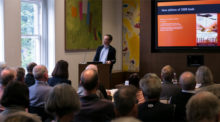Katherine MacIvor
In their presentations to a packed room in the library at the Munk School’s Observatory site, Randall Hansen and Takashi Fujitani contributed to greater understanding and public knowledge of wartime bombing, needless civilian deaths, and morality, as well as the role of racism in military strategy and decision-making – issues that remain crucially relevant to current affairs today.
Bringing together scholars from diverse backgrounds to better understand Asia and its increasingly influential role in global affairs is at the core of the Asian Institute’s mission. Our October 1, 2018, event showcased a prime example of how the Asian Institute works to further interdisciplinary and collaborative research.
The Asian Institute welcomed Professor of Political Science Randall Hansen for his talk, “The Firebombing of Japan: Motivations, Morality and the Effect on the Japanese Surrender.” Hansen is the Interim Director of the Munk School of Global Affairs and Public Policy, as well as the Director of the Centre for European, Russian, and Eurasian Studies, but his lecture at the Asian Institute was in his capacity as a renowned scholar of the impact of war on civilians. Building on the research in his bestselling book Fire and Fury: the Allied Bombing of Germany (Penguin, 2009), which questions the morality and effectiveness of Allied bombing techniques that led to widespread civilian casualties in Germany during World War II, Monday’s talk gave Hansen the opportunity to share the research he has since done to examine similar bombing techniques that were deployed during the same period in Japan.
As a scholar whose research has focused primarily on Europe, Hansen benefitted from the input of Professor Takashi Fujitani for this comparative research. A historian of modern Japan, Fujitani is the author of Race for Empire: Koreans as Japanese and Japanese as Americans during World War II (UC Press, 2011). In addition to providing scholarly input on the research, Fujitani connected Hansen with PhD student Asako Masubuchi from East Asian Studies to perform translations of Japanese texts. Fujitani, the Dr. David Chu Professor in Asia-Pacific Studies at the Asian Institute, also served as discussant at the event. The talk was chaired by Professor Andre Schmid of East Asian Studies.
Hansen’s presentation explained the American shift from precision bombing to area bombing of Japan in World War II, described in vivid detail what it was like to experience the destruction and devastation of the firebombing of Tokyo, and examined the role – if any – played by firebombing in the Japanese surrender. The area bombing campaign led to the destruction of six major Japanese cities, with more than 50% of these cities turned to rubble and ashes. In the firebombing of Tokyo alone, between 80,000-100,000 people were killed – the single largest death toll of any conventional bombing raid in human history (compared to 37,000 in Hamburg, the largest bombing raid in Germany). Examining the issue of morality, Hansen posed that an argument could be made to justify these civilian casualties if they led to a swifter conclusion of the war. However, he concluded that the Japanese surrender had more to do with other factors such as the Soviet invasion, and the firebombing played at most a complementary role.
In his response, Fujitani supported Hansen’s premise that firebombing exerted minimal effect on Japan’s surrender, adding that Japan’s intense desire to maintain the institution of the emperor contributed to its deferred surrender. Fujitani then pivoted from Hansen’s implicit question of “What caused Japan to surrender?” to ask “Why did the US drop the atomic bomb on Japan?” noting how the decision was informed by the issue of race. Fujitani pointed to anti-Japanese/anti-Asian sentiment and law in nineteenth and twentieth century America, which created a predisposition to “not be more careful” in dropping the bomb.
Photos by Dhoui Chang (click to enlarge).
[rl_gallery id=”4044″]
